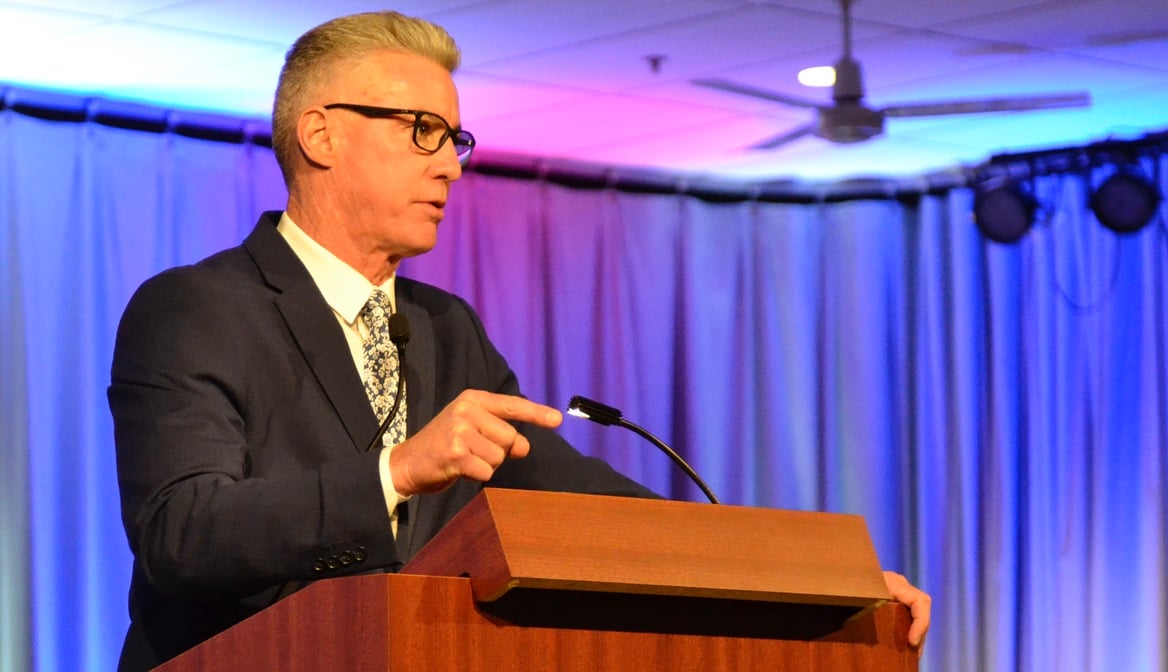
Brothers and Sisters, staying connected to our local communities is part of the important work we do at Local 150. We know that strong unions build strong communities.
It’s events like parades, bass tournaments, golf outings, and others you read about in the paper each month that invite you out to have a good time, while supporting a cause that changes lives for the better. There is real value in knowing our neighbors and giving back to causes that make a bigger impact when we work together.
From the 1980s to early 2000s, the tradition in March was for Local 150 to be part of the downtown Chicago St. Patrick’s Day Parade and the South Side Irish St. Patrick’s Day Parade. The reality was the downtown parade had grown so large there was a considerable disconnect between the event and the community.
This union has always believed in traditions that bring us closer to partners and communities. When Local 150 saw the void, we took the opportunity to start our own parade that brought back that much-needed neighborhood feel.
The Chicago Working Families’ Archer Avenue St. Patrick’s Day Parade started from humble beginnings in March of 2015 with just a few community groups and schools participating. Because people felt a real connection every year since then, even during the pandemic, neighbors asked us to push forward and ensure the parade took place.
Groups came out on side streets, during a time when people were isolated in their homes and disconnected from family and friends. For this reason, the Archer Avenue St. Patrick’s Day Parade is the longest continually running St. Patrick’s Day parade in Chicago.
Now after a decade, the parade is something our neighbors and partners look forward to each year. Last month, 85 unions, community groups, and schools either sponsored or walked in the parade with large crowds gathered on each side of the street. And I’m proud to say that over the last three years we have collected over $300,000 to support and protect our men and women in uniform, with this year’s donation going to the Get Behind the Vest Program.
Beyond events like these, a union like ours builds strong communities because of the fight we take on each day. Fighting for fairness, opportunity, and equal pay tilts the balance of power from employers to workers. This benefits not just our members, but all working families.
Yet, a strong union helps communities even more by the impact we have on our members’ personal lives. By giving you a voice at work, we give you a voice to shape your communities.
Many of our members take active roles in their communities. A great example of this is our fellow Local 150 Brother, District 5 Business Agent, and Illinois State Representative of the 76th District, Lance Yednock. Lance stepped up when we needed a voice for labor in Springfield. He championed the Worker’s Rights Amendment in 2022, ensuring constitutional protection for all Illinois workers to join a union.
Adding to his accolades, last month, Lance was awarded the 2024 Zeke Giorgi Award at a reception hosted by the Illinois AFL-CIO to honor elected officials who advocate for workers’ rights. A picture of this award is placed with the District 5 Report on page nine where we offer a special thanks to Representative Yednock for all he has done during his time in office. He will be missed in Springfield.
While, we realize not everyone will be able to hold office, there are things our members can do at any level, like teaming up with other organizations to make a difference.
Last month, we shared details of our commercial campaign through the Fight Back Fund in response to Governor Pritzker’s appointees to the Illinois Commerce Commission shutting down the natural gas line Safety Modernization Program. We have utilized this campaign as a means to connect with over a million Chicago area residents. By raising awareness about the need to fix dangerous gas lines and create a gradual plan to transition to cleaner energy, without expensive conversion to electric furnaces and appliances, residents now realize their safety is at risk and pocketbooks need to be protected. Hundreds are taking action and calling the governor’s office speaking against the ICC’s decision.
In addition to our campaign, we also have joined forces with a coalition of other unions, businesses, organizations, as well as over 30 Chicago Aldermen and numerous state leaders from across Illinois. The fight for our members jobs, to fix unsafe natural gas lines, and to expose the real cost to go “all-electric” are concerns shared by our partners as well.
The importance of building a strong coalition and working together as we approach the Chicago City Council hearing regarding the Clean & Affordable Buildings Ordinance and the ICC’s Future of Gas Proceedings, means our position is stronger when heard from many viewpoints.
Local 150 will continue to mobilize partners and communities on every front, so we can ensure ongoing improvements are made both in and beyond the workplace. This is always done to protect our members and fight for workers everywhere.
We could not strengthen our communities without you. I offer a big thanks to all of our members, family, and friends who came out to walk in support of Local 150. From the Countryside Parade to the Archer Avenue Parade to the South Side Irish Parade, events like our St. Patrick’s Day parades are more than just about being Irish or “Irish for the Day.”
Your presence puts a face to the union. When communities see a face, they connect to what it is we do. When communities connect to our work, they value it. And when our partners value us, they understand what it means to be union proud. Have a great work season, and stay involved with your community.
United We Stand, Divided We Fall.

